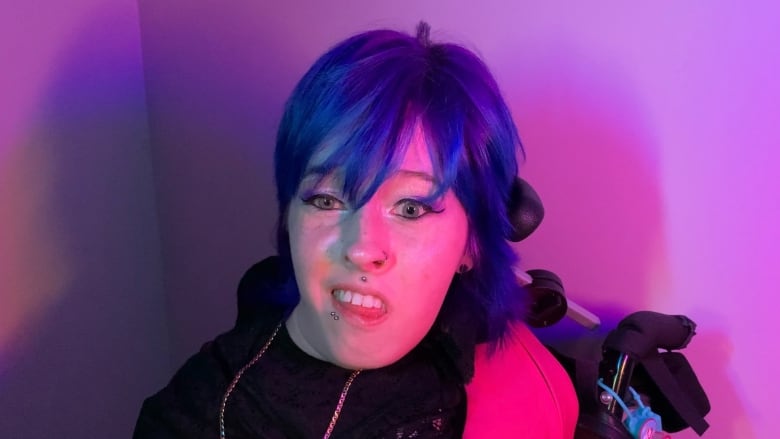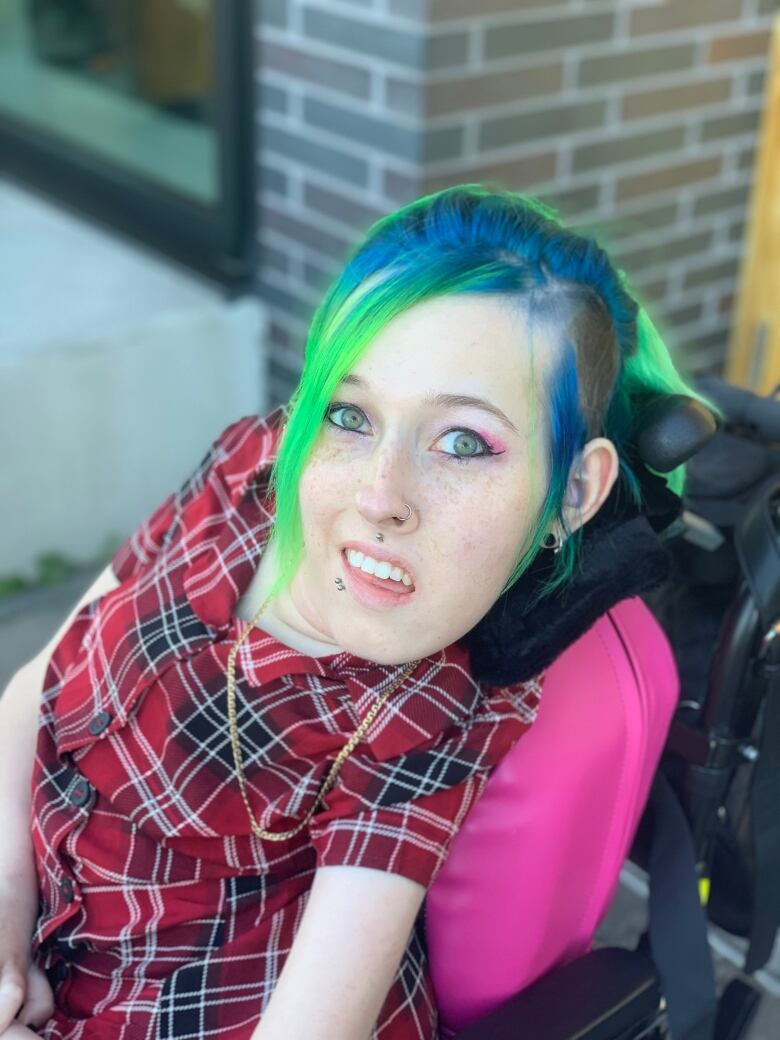I'm queer and disabled. Pride isn't accessible for me
When it’s your own community that doesn’t feel inclusive, it stings even more


This First Person column is the experience of Karli Drew, a queer and disabled activist in Edmonton. For more information about CBC's First Person stories, please see the FAQ. This segment originally aired in June 2022.
I was born with a relatively rare and visible neuromuscular disability — spinal muscular atrophy (SMA) to be specific. I knew I was marginalized before I was old enough to realize there was a term for it. Needless to say, my disabled identity fundamentally shaped who I am and how I interact with the world. I learned to self-advocate and accept my disability at a young age.
But when I was a teenager, I realized I was also queer. It was a lot for me to process. In fact, I had never even encountered another queer and disabled person until I was an adult. My friends were predominantly queer, but they all presented as non-disabled.
For years, I convinced myself I couldn't possibly be both at the same time so I repressed my queer identity.
I was already aware there were broad misconceptions about disability and intimate relationships, and I didn't think I had it in me to dismantle two stereotypes at once.
Pride Month served as a stark reminder of this because it felt like my accessibility needs were ignored by all large-scale Pride festivities.
As a result, I've never been able to attend any Pride events with or without my queer friends.
I can't count on accessible seating areas where my wheelchair can come and go as needed. I can't count on adequate shade or food or water. I can't count on accessible washrooms or a space to go when I inevitably become overstimulated.
And this year, the lack of COVID-19 protections make it less accessible for me than ever. My younger brother, who also had SMA, died from the seasonal flu in 2008, so my worries about community health protections are grounded in reality.
Intersectionality and solidarity
Over time, social media became more accessible to me with the advancement of technology and I subsequently immersed myself in disability-centered spaces. Words can't describe the relief I felt discovering the unapologetic diversity within the disabled community, including those with identities matching my own.
I connected with other queer, disabled people who intimately understood the nuanced struggles and celebrations — such as the added barriers to coming out when disabled or finding doctors who are both queer-friendly and anti-ableist.

It felt like I was finally given permission to be myself unreservedly and able to embrace both defining identities in all their magnificent glory. I made countless, invaluable friends.
It wasn't long until I found out many of them had faced insurmountable accessibility barriers to Pride events worldwide — just as I had. As a result, a lot of us were left with complicated feelings around the idea of "capital-P Pride," which was worsened by the pandemic.
It hurts to watch immunocompetent queer communities in Alberta — and across Canada — gather with little-to-no COVID-19 protections for high-risk queer people such as myself. I feel betrayed by Pride organizers and I've wondered if the importance of community health even crosses their minds. I've always felt governments don't particularly value my life or other marginalized lives, but it feels more personal when it's your own community doing it.
The inaccessibility of local Pride events somehow makes me feel less queer, like an echo of how I felt before I truly accepted myself. Every year, I consider attending and quickly remember the reality of Pride festivals: my access needs aren't prioritized or considered by organizers. I seek and find solidarity and support from queer, disabled communities who share my experiences.
And every year, I conclude Pride exists beyond an event or month because every day is Pride Day when you're queer.

Pride events to come
I'm profoundly grateful for the work done by previous generations of queer activists and I recognize the continued importance of Pride. Even so, I can't ignore the fact work still needs to be done to achieve broad equity and justice for our entire community — not only disabled folks, but also other marginalized populations.
As an activist, I know our efforts for progress can be demoralizing. In my experience, most non-disabled event organizers and business-owners deem a space accessible so long as there aren't stairs. So, asking for anything beyond that is often written off as unnecessary.
Still, I believe in an accessible future with accessible Pride events and year-round accessible queer spaces, including sensory-friendly ones. My story is one of many. The time for an inclusive future is yesterday.
How to do that?
Actively recruit queer, disabled consultants as Pride event organizers.
Follow a variety of queer, disabled activists to learn what's being done right, and what's being done wrong.
Amplify queer, disabled voices.
Acknowledge queer, disabled existence.

Karli Drew is a vibrant-haired writer, creator, and consultant. As a queer, disabled person, her motto is "more activism, less ableism."
Do you have a compelling personal story that can bring understanding or help others? We want to hear from you. Here's more info on how to pitch to us.